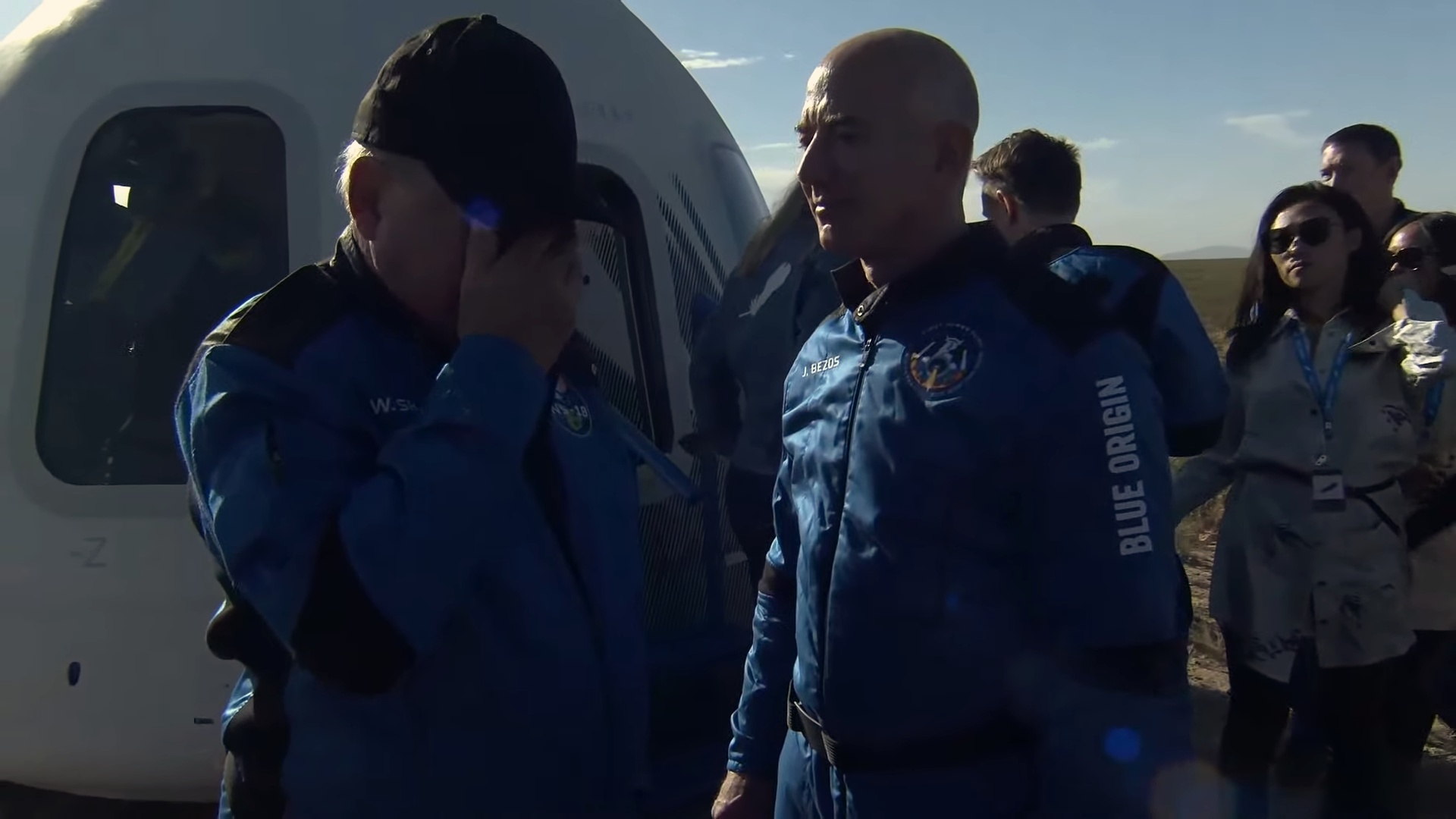William Shatner’s flight to space moved him to tears.
The actor, best known for his role as Capt. James T. Kirk in the original “Star Trek” series, was overcome with emotion after launching to space and back today (Oct. 13) on a suborbital mission with Blue Origin aboard the company’s New Shepard vehicle.
“What you have given me is the most profound experience I can imagine. I’m so filled with emotion about what just happened … it’s extraordinary,” Shatner told Jeff Bezos after landing back on Earth in the New Shepard capsule in West Texas with the help of parachutes. “I hope I never recover, that I can maintain what I feel now. I don’t want to lose it. It’s so much larger than me and life.”
“I am overwhelmed. I had no idea,” he said. “[It] wasn’t anything like the simulation.”

“Everybody in the world needs to do this. Everybody in the world needs to see this,” Shatner said to Bezos, brimming with emotion. “Unbelievable.”
“To see the blue color go right by you and now you’re staring into blackness, that’s the thing,” he added, trying to convey the experience he just went through. “The coloring of blue,” he added.
Shatner continued to wax poetic about how awestruck he was about not just the blue of Earth below but the blackness of space beyond. “Looking into blackness,” he said, you “look down and there’s the blue down there and the black up there … there is mother Earth and comfort and there … is there death?”
“This is life and that’s death,” Shatner said to Bezos, insinuating that Earth is life and outer space is “death.” “In an instant, you go ‘Woah that’s death!’ That’s what I saw.”
“It was so moving to me. This experience, it’s something unbelievable,” he added.
Shatner said that while the physical sensations of spaceflight were strange and interesting, the view and the emotional experience was so much more. “My stomach went up and [I thought] this is so weird. But not as weird as the coloring of blue. This is what I’ve never experienced.”
“The beauty of that color and it’s so thin and you’re through it in an instant,” he added.
“It doesn’t have anything to do with the little green men,” Shatner told Bezos. “It has to do with the enormity at the quickness and the suddenness of life and death.”
Bezos, who flew on Blue Origin’s first crewed launch in July, agreed. “It’s so beautiful,” Bezos told Shatner about his words.
“I can’t even begin to express,” Shatner said. “What I would love to do is to communicate as much as possible the jeopardy, the moment you see how vulnerable. The vulnerability of everything, it’s so small.”
“This air, which is keeping us alive, is thinner than your skin. It’s a sliver. It’s immeasurably small when you think in terms of the universe,” Shatner said about seeing Earth’s thin atmosphere from space.
Shatner’s words echo what astronauts have dubbed “the overview effect,” a psychological effect reported by those who have seen Earth from space. This view has often led astronauts to speak more about how precious Earth is and about environmental issues that threaten our planet as it is.
Bezos and Shatner shared a few laughs after the emotional heart-to-heart, with Shatner remarking about the physical toll of it all with a smile. “Just getting up the bloody gantry,” he joked, referencing the long climb up the stairs the crew had to make to get to the capsule. But amongst their laughing and smiling, Shatner was still overcome with emotion from his journey to space.
“Oh my god, what an experience,” Shatner said.
Email Chelsea Gohd at cgohd@space.com or follow her on Twitter @chelsea_gohd. Follow us on Twitter @Spacedotcom and on Facebook.
Join our Space Forums to keep talking space on the latest missions, night sky and more! And if you have a news tip, correction or comment, let us know at: community@space.com.

Chelsea Gohd joined Space.com as an intern in the summer of 2018 and returned as a Staff Writer in 2019. After receiving a B.S. in Public Health, she worked as a science communicator at the American Museum of Natural History and even wrote an installation for the museum’s permanent Hall of Meteorites. Chelsea has written for publications including Scientific American, Discover Magazine Blog, Astronomy Magazine, Live Science, All That is Interesting, AMNH Microbe Mondays blog, The Daily Targum and Roaring Earth. When not writing, reading or following the latest space and science discoveries, Chelsea is writing music and performing as her alter ego Foxanne (@foxannemusic). You can follow her on Twitter @chelsea_gohd.
